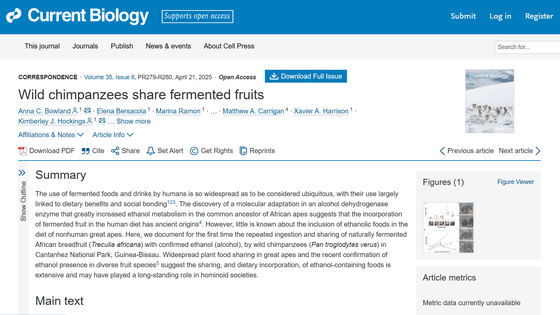First evidence of great apes having 'drinking parties' - wild chimpanzees sharing fermented fruit with peers

A joint research team from the University of Exeter and the University of Roehampton in the UK has reported that wild chimpanzees share and eat naturally fermented fruits among themselves. The research team claims that this is the 'first evidence of non-human great apes sharing fermented foods containing alcohol,' suggesting that banquets in human societies may be a behavior acquired over a long evolutionary history.
Wild chimpanzees share fermented fruits: Current Biology

Are these chimps having a fruity booze-up in the wild? - Ars Technica
https://arstechnica.com/science/2025/04/are-these-chimps-having-a-fruity-booze-up-in-the-wild/
A research team reports that for the first time, wild chimpanzees living in the Cantanjes National Park in Guinea- Bissau repeatedly ingested naturally fermented African breadfruit (Treculia africana) and shared it among their group.
The research team measured the ethanol content of African breadfruit from April to July 2022 and confirmed that 24 of the 28 fruits sampled contained ethanol. In the case of ripe fruits, the average alcohol concentration was about 0.3%.

Because wild chimpanzees are not used to humans, the research team set up cameras in three locations to record chimpanzees eating African breadfruit. As a result, they found that fruit sharing occurred in 10 of the 70 feeding events, and 90% of the shared fruit contained ethanol. The research team claims that this observational record is 'the first scientific evidence of great apes sharing fermented foods that contain alcohol.'
In nine of the 10 sharing events, the chimpanzee who had taken the fruit allowed the other chimpanzee to eat directly from the fruit but not give up the fruit itself, and in the remaining one, the other chimpanzee allowed the other chimpanzee to take a piece of the fruit that had been placed in his or her mouth. The fruit owner did not show any anxiety when the sharing took place, and did not appear to share the fruit under any kind of pressure. In seven of the 10 cases, the fruit was shared despite there being other fruit available.

Regarding the reason why chimpanzees share fruit, the research team argues that 'fruit may be considered relatively high-value fruit among chimpanzees.'
'Fruit that is ripe enough to ferment is easier to pick, and therefore requires less energy expenditure to pick the fruit. Fermented foods also have nutritional benefits, such as higher vitamin content, which the researchers speculate may make fermented fruit a high-value food. Given the widespread presence of naturally fermenting fruits, it is likely that consumption and sharing of fermented foods is widespread across great ape populations.'
While sharing behavior itself has been shown to play an important role in social bonding in wild chimpanzees, consuming alcohol may further promote socialization and sharing behavior by lowering stress levels, activating the endorphin system, and providing feelings of well-being and relaxation. The research team noted that 'social feeding behavior' and 'alcohol consumption' are two major components of human banquets.

The research team poses the question: 'Did banquets come from a common ancestor?', emphasizing that alcohol consumption in human society is not a recently acquired habit but may be rooted in a long evolutionary history.
The team also argued that to fully understand the social context of alcohol consumption and sharing by apes, it is necessary to investigate 'what role alcohol consumption with related and unrelated individuals plays in strengthening social bonds and building social capital, and whether ethanol intake is intentional.' They said that it is necessary to monitor changes in the apes' feeding and social behaviors, as well as measure ethanol concentrations in food.
in Science, Creature, Free Member, Posted by log1i_yk